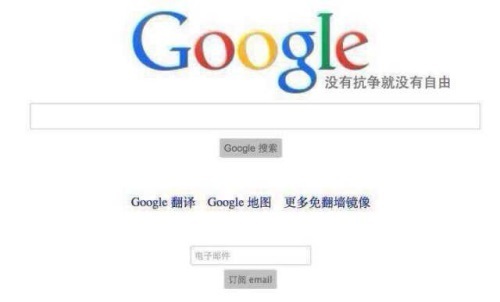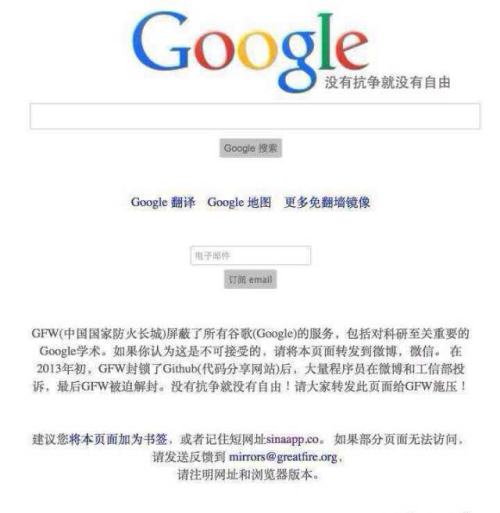
Memorial of flowers at Google’s headquarters in Beijing right before the company left China in 2010.
A Shenzhen man has taken the country’s second-largest telecom provider to court because it hasn’t been able to provide him with Google services after several months, reports Global Times.
Twenty-five year-old Wang Long has filed the first lawsuit of its kind against China Telecom after losing access to Gmail and Google. He noted that China Telecom has already admitted its inability to provide these services to him in court.
[I and China Unicom] have a contractual relation. They should offer me telecom services, yet they still failed to provide access [to these sites and services]. They should be held responsible for this failure.
A verdict is expected later this month.
Google pulled its servers out of China in 2010 instead of acquiescing to government demands to censor its search results.
But as an anonymous cyber security expert interviewed by Global Times points out, Wang’s anger is misdirected. The expert said:
China Unicom has nothing to do with the failure. It is Google that should be blamed, since it does not operate its business in China. I call on companies like Google or Twitter or Facebook to offer services in China and accept [proper supervision].
Photo: Epoch Times
]]> An image of a Google search page that is spreading like wildfire on Chinese social networks is openly encouraging Chinese internet users to protest against internet censorship in China.
An image of a Google search page that is spreading like wildfire on Chinese social networks is openly encouraging Chinese internet users to protest against internet censorship in China.
Google is not behind the campaign, however. It’s a campaign launched by GreatFire.org. It reads as follows [translated from Chinese]:
If there is no resistance, then there is no freedom
The GFW (The Great Firewall of China) screens and hides all services provided by Google including scientific research important to Google academics. If you feel that this is unacceptable, please forward this page on your Weibo and WeChat accounts. At the beginning of 2013 when the GFW closed off access to Github (code-sharing websites), a majority of programmers complained on Weibo and in work correspondence letters until finally the GFW was re-opened. If there is no resistance, there is no freedom! We request everyone to please forward this webpage to put pressure on the GFW!
We recommend that you please add this to your web browser bookmarks, or to please remember the URL address sinaapp.co. If there are some webpages that cannot be visited, then please send your feedback to [email protected] and please specify the URL and current version of web browser used.
Another similar version of this webpage can be seen here, and substitutes the URL address as 1kapp.co.
Google services were most recently targeted in China just before the anniversary of the Tiananmen Square incident, reports Bloomberg.
The company’s online presence has been censored in China since 2010 when it announced it would no longer comply with government regulations and redirected users to its Hong Kong site.
Correction: An initial version of this story claimed that Google was calling on Chinese people to fight the Great Firewall. That is incorrect. Google is not involved with this campaign in any way, to the best of our knowledge.
[h/t @missxq]
Photos: Google
]]>Rock star and Baidu manager Kaiser Kuo greeted the news by tweeting: “Hells yeah, let’s all move to Chongqing!” (As if they need more people).
Many, many others shared in Kaiser’s enthusiasm, though, including me. When friends fly back to Europe or North America from China, one of the first things they notice is just how fast and responsive the “real” Internet is. We’ve become accustomed to no Youtube, Twitter, Facebook, Foursquare and others unless we have a VPN, which is often painfully slow.
So the experiment in Chongqing is a good sign. The government is setting up what’s called a Cloud Computing Special Zone which will offer unfettered and unrestricted access to the Internet. Several companies have already signed up to do business in the zone; they will mostly provide offshore data services. Details from the Global Times:
One factor that helped gain approval for Chongqing’s cloud special zone is that the Liangjiang New Area is important to the development of western China.
The Chongqing government also agreed to meet several requirements, such as data services for clients within China still under government administration, and relevant departments having the authority to carry out sample inspections on the data in the special zone, the report said.
Cao Yujie, consultant director of CCW Research, an IT market research and consulting agency in Beijing, told the Global Times that the cloud computing business is in its early stages worldwide, adding that there is great potential for its development.
“A special optical cable directly connected to the outside Internet is not necessary to run a cloud zone, but its installation in Chongqing could be attributed to demands of foreign companies as some websites are blocked in China,” Cao said.
China neutering the Net Nanny, even if just in Chongqing, is proof that money really does trump ideology.
]]>The blocking of social networking sites began around the time of the riots in Urumqi in 2009. Those holed up in Zhongnanhai figured Twitter was a key tool leading to the revolt in Tehran that year, and it was too risky to hand that tool to the angry masses in Xinjiang. China has been proven correct on its fears: this year Facebook and Twitter have both been key communications and information tools in Tunisia, Egypt, Bahrain, Libya and Syria.
Facebook probably never intended itself to be a political tool, but it certainly makes a good one. That aside, it remains focused on growing the already largest social network in the world, and China remains a big black hole. China has more people online than any other country, yet is an area that Facebook has been unable to penetrate due to restrictions on its service here and hot local social networking sites such as Ren Ren Wang and Kaixing Wang, not to mention Sina Weibo (which is more akin to Twitter).
But it won’t give up. Mark Zuckerberg, who has a Chinese girlfriend and is learning Putonghua, toured China last year and met with executives of Baidu, China’s leading search engine. That could have been a catalyst for this deal (courtesy of Bloomberg):
Facebook Inc. has signed an agreement with Baidu Inc. to set up a social-networking website in China, Sohu.com reported, citing unidentified employees at the Chinese search-engine company.
The agreement followed several meetings between Facebook Chief Executive Officer Mark Zuckerberg and Baidu CEO Robin Li, Sohu.com reported on its website today. The China website won’t be integrated with Facebook’s international service, and the start date is not confirmed, according to the report.
Some analysts have already said, if this new site is not integrated with Facebook’s global network, they’ll have a hard time competing with the established players (mentioned above).
Where does that leave us? Well, considering the Jasmine Revolutions and high inflation in China, the authentic Facebook won’t be made available here anytime soon. And if you can read Chinese, chances are your Chinese friends are already on Renren or Kaixin. So for your typical expatriate who wants to use a social network, the options are learn to read Chinese or use a VPN.
And on that note, if you need VPN advice, check out our earlier article on the topic.
]]>Two major developments have occured; the first is that wildly popular (especially among laowai) email provider Gmail has had intermittent service the last few days. Some users said they couldn’t access their Gmail accounts, others couldn’t send mail, and others couldn’t mark emails as unread. Google itself finally chimed in yesterday, as reported by the Guardian:
“Relating to Google there is no issue on our side. We have checked extensively. This is a government blockage carefully designed to look like the problem is with Gmail,” said a Google spokesman. China’s embassy in Washington was not immediately available for comment.
The announcement follows a blog posting from Google on 11 March in which the firm said it had “noticed some highly targeted and apparently politically motivated attacks against our users. We believe activists may have been a specific target.” The posting said the attacks were targeting a vulnerability in Microsoft’s Internet Explorer web browser. The two firms have been working to address the issue. At the time, Google declined to elaborate on which activists had been targeted or where the attacks had been coming from.
The second major development is that China is beginning to knock out access to VPNs, also known as Virtual Private Networks, or the precious tool that gives us access to Youtube. For those unfamiliar with VPNs, they effectively mask your computer’s IP address (the unique ID given to every device accessing the Internet) and gives it a generic IP address which appears to be from somewhere else, such as the United States. If your computer appears to be in the US, you get two benefits: you can see all the websites behind the Great Firewall, and also have access to US-only services such as Pandora, Hulu and Netflix. Right now, reports on Twitter indicate that Witopia, a popular VPN, and 12vpn are both inaccessible in Mainland China, however this can change minute-by-minute.
One VPN you can try (which still works, at least for me) is Strong VPN. (No, I’m not affiliated with them, although I did find out about them through a friend of mine’s blog.) It’s the best VPN I’ve used thus far, but also a bit pricey. But there are many to choose from, as you can see in this list.
It’s hard to gauge how long the crackdown will last. If I’m a betting man though, knowing how scared China is of any potential unrest, I wouldn’t expect to see Facebook or Twitter unblocked anytime soon, and we can only hope that Gmail will eventually be fully freed.
If you have other VPNs to recommend, please leave them in the comments below.
]]>